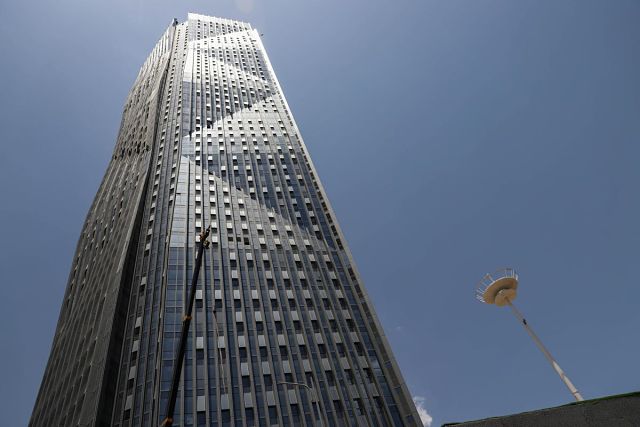 The future headquarters of the Commercial Bank of Ethiopia CBE in Addis Ababa. (Getty Images)
The future headquarters of the Commercial Bank of Ethiopia CBE in Addis Ababa. (Getty Images)
Forbes
Selamawit Girma, a mother of three living in Ethiopia’s capital Addis Ababa, is worried.
Her monthly salary of 4,000 birr (about $91) isn’t going as far as it used to. Inflation surpassed 20% in Ethiopia last year and it’s still rising–up to 24.5% in June–as the country struggles to contain the economic fall-out of the covid-19 pandemic.
“I am very scared of the current cost [of things],” she told The Addis Standard.
“I am afraid of being on the streets with my children. Prices are increasing in house rent, transport, foods and non-food items … which the government seems to be doing very little about.”
It’s not for want of trying. Ethiopia has one of the most stable and diverse economies in Africa, benefiting from a forward-looking government that has consistently met development targets for its 117 million citizens. The number of Ethiopians living below the poverty line has more than halved since 2000.
Yet, whatever strides are taken domestically, Ethiopia exists within a global financial order that puts the US dollar–the world’s only reserve currency–at its apex.
Supply of these dollars is determined solely by the US Federal Reserve, which has a mandate solely to protect US economic interests.
And while printing trillions of dollars to stimulate demand seems to be helping America–in the short-term, at least–the practice is having a devastating impact on poorer nations whose currencies are directly or indirectly pegged to USD.
“The Fed is tasked with solving US monetary problems and not [those of] other countries,” explained a spokesman for Project Mano, an Ethiopian lobby group that wants Addis Ababa to consider whether bitcoin–a decentralized cryptocurrency with a fixed supply–can break the inflationary cycle.
“It is our problem, because we rely on another country’s monetary policy. They don’t do it out of spite or to hurt us … It’s our own choice to hold dollars.”
Understanding how ultra-loose monetary policies in the West can hurt developing nations isn’t difficult.
The not so almighty dollar
The National Bank of Ethiopia currently holds about $3bn worth of foreign exchange reserves–the vast majority of which is in USD.
These holdings don’t increase proportionally as the Fed prints more and more money, so their real value–or their purchasing power–is gradually eroded by inflation.
At the same time, Ethiopia’s government is overseeing the steady devaluation of its own currency, the birr, in an effort to stop the country’s $12bn trade deficit from growing any larger. (Devaluing a currency makes domestically produced goods more affordable on the international stage, thereby driving exports and helping to balance the books.)
Taken in isolation, each of these trends would be manageable.
But when the value of a country’s domestic currency and the value of its foreign reserves fall in tandem, there is a real and present danger of economic meltdown. Ethiopia must preserve the value of its USD holdings–or an equivalent reserve currency–in order to shield itself from hyperinflation at home.
And it’s getting much harder to do that–not just because of the Fed’s endless money-printing, but also the fact that Ethiopian Airlines, one of the country’s main earners of foreign currency, is facing an uncertain future thanks to covid-19.
With Ethiopia’s GDP rate now growing four times slower than its inflation rate, the country is staring default down the barrel of a gun.
So, what to do about it?
It could simply buy more dollars. That’s China’s approach: more than half of its $3.2tr worth of foreign exchange reserves is believed to be USD, which it uses to manipulate the USD/CNY exchange rate and keep exports rolling off the shelves.
Trouble is, developing nations like Ethiopia can’t afford to stack trillions of dollars.
That leaves three options: hope that America will stop debasing the world’s reserve currency; find new, reliable sources of USD; or, diversify the state’s holdings beyond dollars–preferably by acquiring an asset with a fixed supply that cannot be manipulated by foreign governments. Enter bitcoin.
“Adoption of bitcoin or cryptocurrency in general is scary for any government, but … our project mainly aims at exploring solutions to solve forex issues the government might be facing,” Project Mano asserted. “Since everything else they hold grows in supply–including gold–we are suggesting [they find] something that doesn’t grow, as an experiment.”
Project Mano’s long-term vision encompasses three spheres: mining bitcoin; holding bitcoin; and linking bitcoin to the birr.
The latter two would, in theory, solve the problem of a depreciating reserve currency–but only if bitcoin fulfills its promise and matures into a globally recognized asset class. That, the lobbyists admit, will be seen as a “gamble” by the government.
A safer bet is their proposal to mine and monetize bitcoin–particularly given Ethiopia’s unique energy landscape and developmental status.
A costly green revolution
The East African country has abundant supplies of renewable energy: 90% of its electricity is already powered by domestic hydroelectric plants, with the remainder largely coming from wind, solar and geothermal sources.
That’s just a fraction of its future potential. The government hopes to grow renewable generation capacity fivefold to 25,000 megawatts (MW) by 2037, of which 6,500MW will come from one flagship project: the Grand Ethiopian Renaissance Dam (GERD), situated in the Blue Nile River.
—
Join the conversation on Twitter and Facebook.

























